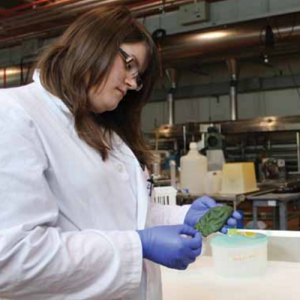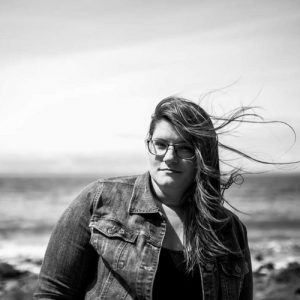 Introducing students to new and unexpected areas of interest and helping to expand their thinking and understanding is what inspires Mount Saint Vincent University Biology Laboratory Instructor Megan Fisher in her day-to-day work.
Introducing students to new and unexpected areas of interest and helping to expand their thinking and understanding is what inspires Mount Saint Vincent University Biology Laboratory Instructor Megan Fisher in her day-to-day work.
“Sitting down with my class on the first day I ask: ‘How many students are here because they’re passionate about plants? And how many of you are here because this is a requirement for your program?’ When people only put their hands up for the latter question it starts you out on the backfoot, but I kind of like that, because at the end of the course, I have students who will say, ‘This was my favourite class this term,’ and ‘I want to take more classes in plant biology.’ That’s what I like most – being able to show these students that there are things outside of their interests that are also valuable, and maybe that can change their paths,” she says.
Sharing her passion
It was just this sort of teacher who helped Megan to discover her love of plant biology, an area that she hadn’t given a lot of consideration before finding herself in Dr. David Kristie’s classroom at Acadia University. She credits him with fostering her strong interest in the subject matter.
 “My professor at the time, Dr. Kristie, could see that passion. I really admire him, still speak to him regularly, and invite him to do talks for my courses. I really appreciate how much effort he put into allowing me to explore that area,” says Megan. “I walked into his classroom and I just loved his energy, and I found the subject matter extremely interesting. I learned things about plants that I had no idea were as complex and involved as they are. A lot of people think plants are just stationary, sedentary, inanimate, but they’re so complex. Now, I get to share that same passion with my students.”
“My professor at the time, Dr. Kristie, could see that passion. I really admire him, still speak to him regularly, and invite him to do talks for my courses. I really appreciate how much effort he put into allowing me to explore that area,” says Megan. “I walked into his classroom and I just loved his energy, and I found the subject matter extremely interesting. I learned things about plants that I had no idea were as complex and involved as they are. A lot of people think plants are just stationary, sedentary, inanimate, but they’re so complex. Now, I get to share that same passion with my students.”
Discovering her love of plant biology ultimately changed the course of Megan’s studies and influenced the work she’s doing today. Now, with a diverse research background in plant physiology, plant microbial ecology, and pathogenic microbiology as it relates to food crops, Megan is a biology laboratory instructor at MSVU, focusing primarily on botany and ecology. Before joining MSVU full-time in mid-2020, she taught part-time at the university and elsewhere. She holds a Bachelor of Science (Honours) and a Master of Science in Biology from Acadia University.
“I love what I do. It’s more than a job to me – it’s about sharing a passion with students,” she says.
Finding new ways of doing things
Starting in her new role in the middle of the pandemic has required some out-of-the-box thinking around how to make her coursework as interesting and engaging as possible, particularly considering the usual hands-on nature of laboratory work. Megan says that she and Kevin Shaughnessy, the other full-time laboratory instructor in MSVU’s Biology Department, have collaborated closely to come up with creative ideas.
 “The pandemic has presented some very unique challenges. We have had to adapt a lot to make remote labs work for students and for us. We understand the value of those in-person experiences – we have the laboratory portions of courses so that students can handle materials, practice techniques, and gain an understanding of how things are physically done and how this research is completed, not just the theory behind it,” she says.
“The pandemic has presented some very unique challenges. We have had to adapt a lot to make remote labs work for students and for us. We understand the value of those in-person experiences – we have the laboratory portions of courses so that students can handle materials, practice techniques, and gain an understanding of how things are physically done and how this research is completed, not just the theory behind it,” she says.
Focusing on ‘soft skills’ that support students’ capacity to do research and which they will use in future labs is one way the laboratory instructors have shifted their coursework for at-home learning. Using common household items for home-based lab experiments is another.
“Through this pandemic, we’re focusing on the things that will make the rest of the labs easier for students when they do return in-person,” she says. “We were able to develop a few experiments that students could do at home with materials they’re likely to have at home or can acquire very inexpensively, like potatoes, water, and salt. We’ve also sometimes asked them to go outside to do an experiment. Of course, we have alternatives if they’re unable to achieve some of these things, but at least we’re getting them to do hands-on learning.”
As part of their coursework, Megan’s students are also evaluating experimental findings, understanding the process of how data is collected and handling data to create results in the form of figures and plots. Additionally, senior-level students have been engaged in exercises meant to improve how well they comprehend and interact with complex, scientific writing.
“I have them reading research articles and answering questions that challenge their interpretation, understanding, and retention of that information,” says Megan. “I also had them start doing scientific writing exercises, focusing on those softer skills that complement the in-person, practical experiments that they would be doing because they will be returning to those things and getting those hands-on skills again.”
Looking ahead
In addition to teaching, Megan looks forward to being involved with colleagues at MVSU to continually enhance existing labs to reflect new and emerging research. She also hopes to help develop new labs and to possibly participate in research being done at the university when opportunities arise and her schedule permits.
“We have an excellent research program at MSVU,” she says. “In the area of plant biology, Dr. Qaderi’s lab is very prolific. They’re doing some amazing research there about the impacts of climate change on plants and related adaptations in terms of food production. It’s a really important area of study, especially now, to have a firm understanding of how plants not only interact with each other but also how we interact with them.”
Having taught at small institutions throughout her career, Megan finds herself feeling at home as a member of the MSVU community. She says it’s a combination of her supportive department and how the size of the university makes it possible to quickly develop strong relationships with colleagues. She’s looking forward to the return of on-campus learning and getting to spend time in her office, with her students, and with other members of her department.
“I’m just really excited to be here,” says Megan. “I’m honoured, honestly, to have been chosen for the position because I know how sought-after they are and how infrequently a position like this comes up. I do think that I can bring a lot to the university and I can’t wait to actually be on campus. I’m excited to be part of this university.”
![]() We’re advancing research, scholarly work and professional activity. Learn more about this MSVU Strategic Plan Theme »
We’re advancing research, scholarly work and professional activity. Learn more about this MSVU Strategic Plan Theme »